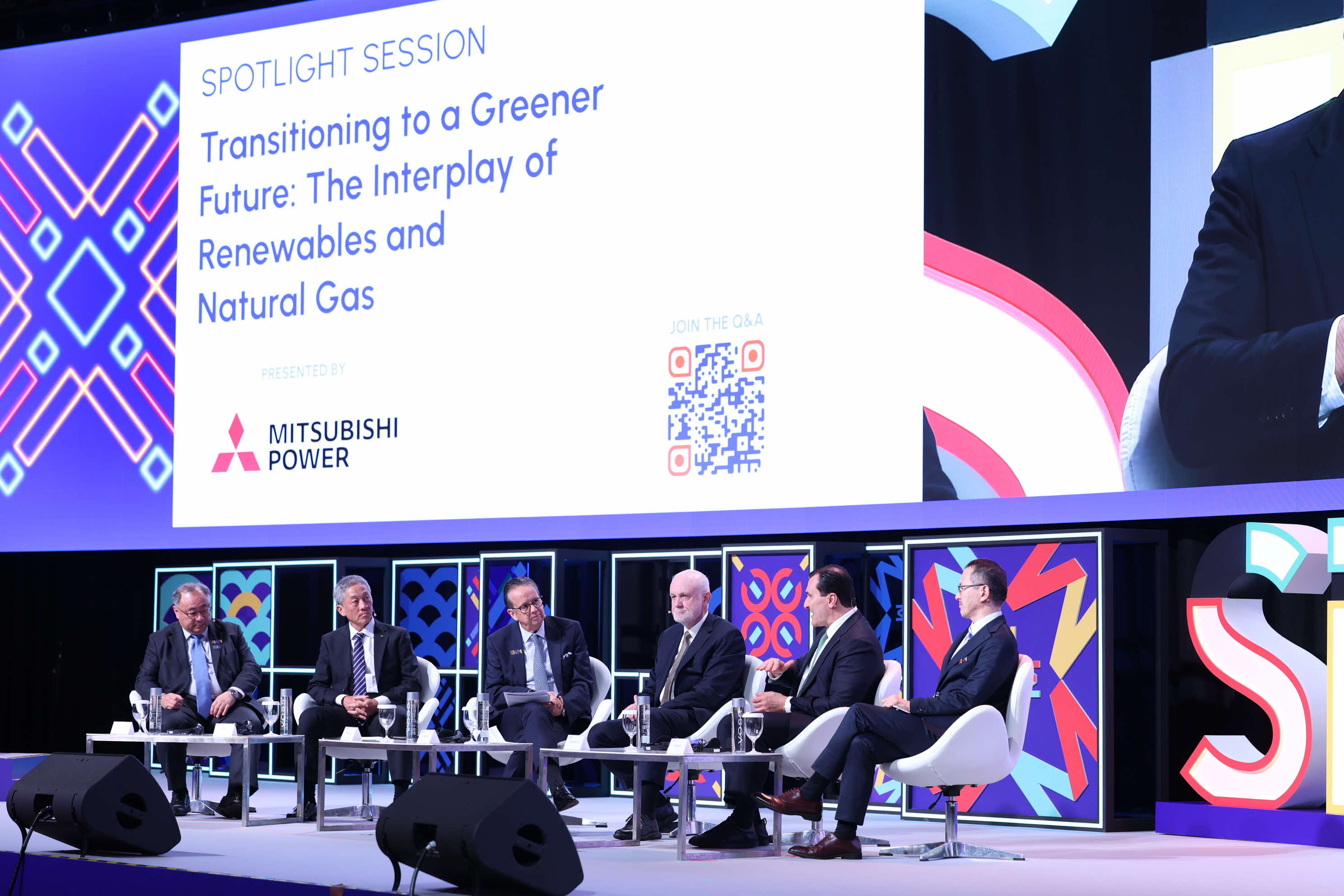The panel for the Spotlight Session, on "Transition to a Greener Future: The Interplay of Renewables and Natural Gas", explored the complex challenges of the global energy transition. Moderated by Mr Martin Houston, Senior Advisor, Moelis and Company, the discussion focused on balancing renewable integration, grid stability, and managing growing energy demand. Speakers emphasised the importance of maintaining energy affordability to sustain public support and highlighted the ongoing role of fossil fuels in ensuring energy stability during the transition.

Integrating renewables with conventional energy sources
Mr Takao Tsukui, Executive Vice President of Mitsubishi Power, emphasised the complementary relationship between gas generation and renewables. "Gas generation actually supports the expansion of renewable investments," he said, stressing the role of gas in balancing the variability of solar and wind energy.
He highlighted the flexibility of gas turbines, which can transition to alternative fuels like hydrogen or ammonia, aligning with long-term decarbonisation goals. Mr Tsukui also underscored the potential of carbon capture technologies in achieving net zero emissions, making gas a vital part of a sustainable energy future.
Mr Mark Christie, Commissioner of the US Federal Energy Regulatory Commission (FERC), added that dispatchable resources, such as natural gas, are essential for grid reliability. "Can we have a reliable power grid without natural gas? The answer is no," he stated. He explained that grid stability requires a balance of power "every second, minute, hour, and day", which cannot be achieved with renewables alone due to their intermittency.
Mr Christie also highlighted the increasing global demand of energy, driven by electrification trends, further underscoring the need for reliable, dispatchable energy sources.
The triple breakthrough
Mr Masanori Tsuruda, Deputy Commissioner for International Affairs at Japan's Agency for Natural Resources and Energy, Ministry of Economy, Trade and Industry introduced the "triple breakthrough" approach adopted by ASEAN countries. This strategy aims to simultaneously achieve emissions reduction, economic growth, and energy security. "None can be sacrificed," he emphasised, noting that "balancing all three is essential to gaining public support" for the energy transition.
The role of dispatch resources
Mr Christie identified gas, nuclear, and coal as the three main dispatchable resources that are essential for meeting rising energy demand and ensuring grid stability.
Mr McMonigle, Secretary General of the International Energy Forum (IEF), stressed the need for continued investment in fossil fuels during the transition period. "Until we develop the necessary technologies—the 'plan B'—we must continue with 'plan A', which includes ongoing investments in fossil fuels to ensure energy stability." He cautioned that neglecting these investments could lead to market volatility and high prices, weakening public support for the energy transition.
McMonigle also advocated for a flexible approach, noting that "each country should have its own pathway to the energy transition, leveraging the resources it has available". This multi-dimensional approach allows nations to tailor their strategies for their development needs.
Mr Leong Wei Hung, Chief Executive Officer of Singapore LNG Corporation (SLNG), emphasised the importance of energy stability for economic hubs like Singapore. "As the world continues to grow, Singapore remains an economic powerhouse, attracting investors who expect a stable energy supply," he noted. He added that SLNG plays a critical role in providing the necessary energy for growth while pursuing net zero goals.
The insights shared during the session highlighted the complexities of the energy transition. A future where gas and renewables work in tandem, supported by technologies like carbon capture, will be essential. The global transition pathway must be flexible. It must allow each country to leverage its unique resources and circumstances, while pursuing sustainable and stable energy solutions in achieving a sustainable energy future.
Stay tuned as the conversation evolves throughout the day. Follow @SIEW_sg on Telegram and Twitter for key insights, as we navigate Day 1 together.